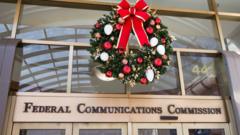This judgment indicates a shift in the legal landscape regarding internet regulation, sparking contrasting reactions from various stakeholders.
In a recent ruling, a U.S. court has dismissed the Biden administration's efforts to reinstate net neutrality rules, determining that the federal government lacks the authority to regulate internet service providers (ISPs) in a utility-like manner. The outcome is viewed as a major blow to proponents of an open internet who have been advocating for regulations that mandate equal treatment of online content by companies such as AT&T and Verizon.
The original net neutrality rules were enacted by the Federal Communications Commission (FCC) under former President Barack Obama, only to be revoked during President Donald Trump's administration in 2017. As Trump prepares for a potential return to the White House, this recent judicial decision seems to conclude the protracted legal dispute surrounding net neutrality.
Judges from the Sixth Circuit Court of Appeals remarked that the issue of net neutrality has oscillated with changing administrations. They referenced a recent Supreme Court ruling that constrains federal agencies' authority to interpret laws, stressing that the FCC's interpretations need not be afforded deference. The court noted that stating their decision ended the FCC's inconsistent regulations aligned with the precedent set by the Supreme Court’s decision, particularly in the case known as Loper Bright.
Brendan Carr, a Republican FCC member appointed by Trump, expressed satisfaction with the ruling, viewing it as a rejection of what he termed the Biden administration's "Internet power grab." In contrast, Jessica Rosenworcel, the FCC's outgoing Democratic commissioner, emphasized the need for Congress to respond to consumers' demands for a fair and open internet, following the court's decision.
The contentious debate surrounding net neutrality previously drew massive public engagement, particularly through initiatives such as comedian John Oliver's campaign, which encouraged viewers to voice their support for the regulations. Despite fading from the national spotlight since the 2018 repeal, advocates contend that reinstating national rules remains paramount to ensuring ISPs do not exploit their position by limiting access to certain content or imposing higher fees for favorable service conditions.
While the court's decision leaves room for state-level net neutrality laws to persist, critics argue it creates a regulatory void that increases consumer vulnerability, allowing ISPs greater influence over internet access. Public Knowledge, a progressive internet policy group, condemned the court's interpretation of ISPs merely as "information services" rather than telecommunications providers, positing that this eroded the FCC's capacity to enforce privacy measures and public safety protocols.
Conversely, the industry group USTelecom welcomed the ruling as a positive development, claiming it would foster innovation, investment, and competition within the rapidly evolving digital marketplace. The clash illustrates the ongoing tension between regulatory principles aimed at ensuring consumer protection and the interests of service providers in a competitive economy.
In a recent ruling, a U.S. court has dismissed the Biden administration's efforts to reinstate net neutrality rules, determining that the federal government lacks the authority to regulate internet service providers (ISPs) in a utility-like manner. The outcome is viewed as a major blow to proponents of an open internet who have been advocating for regulations that mandate equal treatment of online content by companies such as AT&T and Verizon.
The original net neutrality rules were enacted by the Federal Communications Commission (FCC) under former President Barack Obama, only to be revoked during President Donald Trump's administration in 2017. As Trump prepares for a potential return to the White House, this recent judicial decision seems to conclude the protracted legal dispute surrounding net neutrality.
Judges from the Sixth Circuit Court of Appeals remarked that the issue of net neutrality has oscillated with changing administrations. They referenced a recent Supreme Court ruling that constrains federal agencies' authority to interpret laws, stressing that the FCC's interpretations need not be afforded deference. The court noted that stating their decision ended the FCC's inconsistent regulations aligned with the precedent set by the Supreme Court’s decision, particularly in the case known as Loper Bright.
Brendan Carr, a Republican FCC member appointed by Trump, expressed satisfaction with the ruling, viewing it as a rejection of what he termed the Biden administration's "Internet power grab." In contrast, Jessica Rosenworcel, the FCC's outgoing Democratic commissioner, emphasized the need for Congress to respond to consumers' demands for a fair and open internet, following the court's decision.
The contentious debate surrounding net neutrality previously drew massive public engagement, particularly through initiatives such as comedian John Oliver's campaign, which encouraged viewers to voice their support for the regulations. Despite fading from the national spotlight since the 2018 repeal, advocates contend that reinstating national rules remains paramount to ensuring ISPs do not exploit their position by limiting access to certain content or imposing higher fees for favorable service conditions.
While the court's decision leaves room for state-level net neutrality laws to persist, critics argue it creates a regulatory void that increases consumer vulnerability, allowing ISPs greater influence over internet access. Public Knowledge, a progressive internet policy group, condemned the court's interpretation of ISPs merely as "information services" rather than telecommunications providers, positing that this eroded the FCC's capacity to enforce privacy measures and public safety protocols.
Conversely, the industry group USTelecom welcomed the ruling as a positive development, claiming it would foster innovation, investment, and competition within the rapidly evolving digital marketplace. The clash illustrates the ongoing tension between regulatory principles aimed at ensuring consumer protection and the interests of service providers in a competitive economy.




















